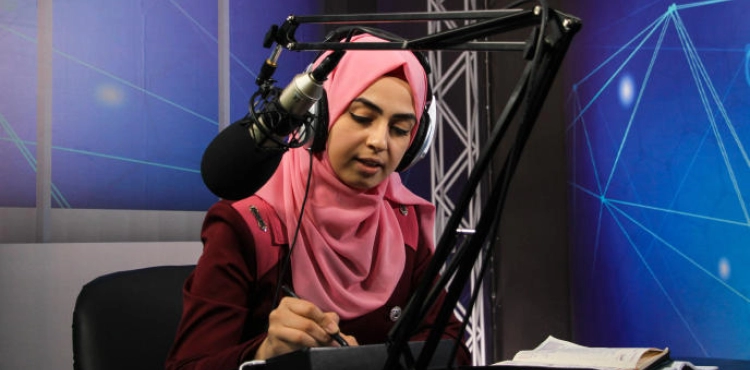The Ministry of Education in Gaza has resorted to a new method for teaching Palestinian students remotely by broadcasting educational lessons in the local radio broadcast, in light of the suspension of school hours in the country, as precautionary measures to prevent the spread of the Covid virus - 19 (SK) in the sector.
Students in Gaza began to enroll in their classes electronically, after an absence of more than two weeks, where teachers and teachers specialize in explaining various subjects such as Arabic, mathematics, English and technology for students.
Explanation of lessons is broadcast directly through the radio account on the social networking site "Facebook", where each lesson lasts about 25 minutes, while all lessons are saved through the radio site to allow learners to rely on them as a reference for them.
About 40 teachers and schools, chosen based on academic and technical standards, rely on the technique of teaching on an electronic whiteboard, which is a small tablet computer that is written using a pen of its own, while appearing on the public page in Facebook as if it is a blackboard and is written using chalk.
The director of educational radio, Muhammad Sharif, from Gaza, told Xinhua, "The last days have witnessed a great demand from students to watch and follow their educational lessons through the platforms of the educational radio."
Sharif explained that the number of views exceeded 2 million views since the start of broadcasting educational lessons electronically, noting that this gives a clear indication that students are interested in their lessons.
He added that "what distinguishes this mechanism in education is the property of direct interaction between the student and the teacher, in sound and image, where the student can ask his teacher directly and receive the answer that he wants at the same moment."
Educational radio was established in 2012 in the Gaza Strip, as it aimed to provide lessons for high school students, in order to improve their academic achievement over those years.
However, the radio has developed its educational plan to include all educational stages for students, in order to contribute to the education of students in light of the precautionary and preventive measures implemented by the Palestinian government.
The Palestinian government declared a state of emergency on the fifth of this month after the first infection with the Corona virus was discovered in Bethlehem, as the city was closed and preventive measures were taken in it to prevent the spread of the disease.
The number of injured people in the Palestinian territories reached 39, after it was announced that a new case had been discovered for a returning student from Poland in Tulkarm.
Because of the precautionary and precautionary measures, the Arabic language teacher Alaa Al-Khatib, 25, of the Gaza population, was unable to attend her classrooms in the school and teach her students for more than two continuous weeks.
Al-Khatib replaced that by providing her lessons on the radio, to explain the lessons to her students directly on the Facebook page, and to receive communications from many students from the West Bank and Gaza Strip.
"It is a very beautiful experience, I was enthusiastic and motivated to go into it, because it keeps both the teacher and the student from the routine of teaching," Al-Khatib told Xinhua after completing her first session, noting that this helps greatly to motivate the student towards study.
And she adds that distance education allows the student to be more explicit in expressing his opinion to his teacher, unlike his case in the classroom that he usually lacks the audacity to do so.
Al-Khatib notes that distance education has many positive aspects, among which it allows the teacher to also receive feedback on the ways of teaching it. If it is positive, it works to reinforce it, but if it is negative, it gives him the possibility to modify from developing his educational tools.
It highlights that China is one of the first countries to be able to simulate its successful experiences in distance learning, and that the Palestinians "always look to China and its educational systems as a model of pride, and can be emulated."
The radio workers aspire to become a pioneering media educational system for all stages, and to establish an educational educational TV of the official institutions, and we have started to implement it officially.
The child, Muhammad Totah, a resident of Gaza City, spends about two hours a day in front of his laptop computer to follow his lessons and take notes on his notebook.
Totah (10 years) says, "This is the first time that I study through Facebook and follow my lessons with a new teacher, but I benefited a lot, especially as the teachers are explaining the lessons in a good way."












